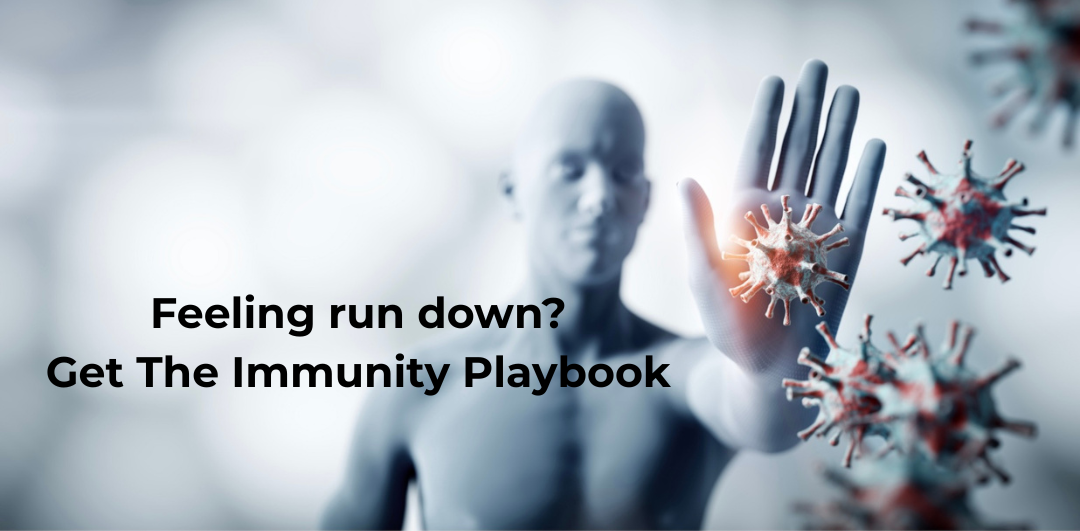Hormone Imbalances: Symptoms, Testing and How to Fix Them
Apr 19, 2021
Amy is a 42-year old super busy mom of three boys. She’s taken on the role of PTA volunteer, class mom for two of her boys’ classrooms, and coordinates the schedule for her oldest son’s baseball team. In the last year, she hasn’t been feeling like herself. She has somehow gained an extra 15 pounds (hello muffin-top!), feels like she is ready for bed at 4 pm, and can’t ever seem to remember where she put her keys (inevitably right before she leaves for school pick-up). She always feels completely depleted and gets annoyed at every little thing. She keeps thinking that something is “off” and that she should go see her OB-GYN.
Every evening, Amy usually comes home after chauffeuring everyone to and from their sports and after school activities and cooks dinner for the family. When her husband comes home around 6 pm, they all have dinner together. This particular Thursday, when her husband got home, something seemed off.
The driveway was cluttered with toys the kids had left out, the garage and door to enter the house were both left open, and when he walked in dinner wasn’t ready. It looked like it hadn’t even been started. The kitchen looked like a tornado had been through it. The kids were in the basement, yelling and playing kickball (never allowed inside). Amy’s husband was feeling something was wrong. Heart beating faster, throat tightening up, her husband slowly peeked into the living room.
There lay Amy, on the couch, sound asleep…it was 5 pm.
Feeling concerned because he has never seen her sleeping at this hour, Amy’s husband tried to wake her up.
But she was so exhausted, she barely responded to him before he helped her up off of the couch and straight to bed. This was so unlike her. She had been feeling like this more and more recently, but today was a different kind of tired. This was the day that Amy decided she needed to figure out what was going on with her health. Why was she so exhausted all the time?
Signs of a Hormone Imbalance
Many women don’t know that hormonal imbalances are causing them to feel like crap. My clients come to me worried and frustrated because they haven’t gotten any answers from the last 5 doctors they’ve seen. They start by complaining of weight that won’t come off no matter what they do, persistent irritability, extreme exhaustion, very low-stress resilience, irregular or painful periods, dry lady parts, and a tanked libido. They feel like their bodies are protesting and have completely turned against them. I’ve heard so many stories: women who would rather scroll through Instagram than have sex with their partners; women who worry they can’t climb the corporate ladder because of brain fog; women who are tired, overwhelmed, and just plain unhappy.
Take Stacy. She’s a high-powered executive, working 60 hours a week for the past 15 years. She’s got three kids at home, a full-time, live-in nanny, and a busy life outside of work. Recently, she’s gained 40 pounds (most of it around her waist), started having night sweats (the kind where she has to get up and change her pajamas in the middle of the night), and she’s now feeling extremely exhausted…all…the…time. In the last several months her period has been really unpredictable and the cramps are taking over a few days (sometimes longer) leading up to her period). She’s worried it’s going to start affecting her ability to do her job.
Then there’s Annie. She’s a stay at home mom with three kids (ages 4, 3 and 4-months old). After long days with her two oldest boys, she still gets up 2-3 times a night to feed her 4-month old daughter. Not only that but in the evenings she helps out with the youth group at church. She’s completely exhausted, gets angry and snaps at everyone too often, and has zero interest in sex with her husband. She’s worried about her marriage falling apart because of the lack of physical intimacy with her husband and worries that her kids will not want to be around her anymore because of her lack of patience.
If you think you have signs or symptoms of hormone imbalance, you can get testing done to find out which of your hormone levels may be off and to figure out why. And don’t let anyone tell you it’s all in your head! If you think something is off, you are probably right!
Ways to Test for a Hormone Imbalance
Here are a few different ways to test for hormone levels.

Here are the hormones you can ask your doctor to test for:
- Thyroid Panel: TSH, free T3 free T4, reverse T3
- Cortisol
- DHEA
- Estradiol
- Progesterone (on day 21-23 of your cycle)
- Total Testosterone
- Free Testosterone
- Fasting Insulin
- Fasting Glucose
- Vitamin D3
- Iron
If your doctor will not order the testing for you, schedule a consultation with me so I can offer you suggestions for getting these tests done at home.
How to Fix Hormone Imbalances
Once you’ve identified which hormones are out of balance, there is a “hormone harmony protocol” for each imbalance or combination of imbalances. Be sure to check out my other articles for each of these steps in more detail.
I’m a Functional Medicine Coach, specializing in helping women uncover the real reasons for their hormone imbalances and fixing them using an integrative approach. I was trained in Dr. Sara Gottfried’s Hormone Cure system, and I apply it (because it works) along with several additional strategies that make a huge impact on the results my clients are looking for. The additional strategies that I use create a very customized approach to hormone balancing.
I believe that feeling sleep deprived, exhausted, having brain fog, low libido, and excess weight are not diseases for women over a certain age. And I DO NOT believe that the answers to these problems can be found in a bottle of prescription pills or in an injection and certainly not solved by eating less and exercising more.
These hormonal problems are just our bodies trying to tell us that something is wrong, and I’m here to help you figure out exactly what that is so you can address it.
These are the steps that I take my clients through. We first identify WHAT their hormone imbalances are, and then we identify WHY they are suffering from these issues. Once we have that information, we can then design a plan to correct the hormone imbalances, get healthy, and stay that way.
Step One: IDENTIFY FOOD SENSITIVITIES & INTOLERANCES
Hippocrates, the father of medicine, said that “All disease begins in the gut.”
Your digestive system is a 20 to 30 foot-long tube that serves as the manufacturing process of turning the food you eat into fuel for your body. What enters your digestive system is dissected by the cells that line your digestive tract and whatever is found to be worthy, becomes, well… “you.”

Along their journey, these nutrients are processed by digestive enzymes, beginning in the mouth, broken down by millions of specialized cells and trillions of friendly bacteria, and then separated out by the immune cells that defend your vulnerable body. Our immune cells make the judgment call between what is good for us and what has the potential to harm us. Food sensitivities cause our immune system to react as if it were protecting the body from an invader, such as bacteria, a virus, or parasite. This reaction to common foods causes systems within your body to begin malfunctioning and after a while of continuous exposure, the body shows signs and symptoms in a variety of ways.
Some common symptoms of food sensitivities are:
- Dermatitis, Eczema and other skin rashes • Irritable Bowel Syndrome, Colitis, Diarrhea • Migraine, Depression and other neurological issues • Interstitial Cystitis • Hormone Imbalances
What to do: Test for food sensitivities
This is not an allergy test that you get from your doctor. Most conventional doctors will not prescribe a food sensitivity test and in most cases, insurance will not pay for it. You can check with your doctor or check with your insurance plan for someone who will prescribe and whether it will be covered. Contact me for help with food sensitivity discovery. I can help.
Why is this important?
Discovery of food sensitivities or intolerances helps to remedy a wide range of health problems from obesity to depression to diabetes. When you remove the specific foods that disturb your body’s unique biochemistry, you can heal and operate at peak performance.
When you have the results of your food sensitivity test, you will finally know exactly what you should and should not be eating. This is extremely empowering and will likely motivate you to make changes based on this new knowledge. You’ll finally have a concrete reason to change what you are eating, and will no longer have to guess what is causing your health problems. Having these results removes confusion and provides clarity.
Step 2: IDENTIFY NUTRIENT DEFICIENCIES
40% of adult Americans and over nine million children over the age of six are obese. 32% of adult Americans are overweight. When you see us, we don’t look like we have nutritional deficiencies. We look like we eat way too much food! But all of those calories don’t translate into nutrients. We are a nutrient-deficient society. And here’s why:
- We eat too much sugar, refined carbs, and processed foods. Processed food is literally stripped of its nutrients. Then, to make it worse, we add dangerous chemicals that poison our cells.
- We don’t eat enough nutrient-dense, whole foods. Couple that with the fact that our soils are depleted of essential nutrients, our air is polluted plus the unrelenting stress of our daily lives- all drain the body of micronutrients or block their absorption.
- We overuse drugs. Over-the-counter, prescription, caffeine, alcohol, recreational drugs…it doesn’t matter which type you choose. Every single one of these may interfere with your body’s ability to absorb specific essential nutrients from dietary sources.
Nutrient deficiency is the leading cause of many modern illnesses and health problems. Simple micronutrient support is one of the most powerful weapons in your self-arsenal. If you have headaches, sleep problems, hormone imbalances, or joint aches, this is important for you!

What to do: Get your cellular micronutrient levels tested.
Micronutrient testing provides a nutritional assessment of deficiencies and borderline deficiencies that are vital to preventing chronic disease and achieving wellness. This test measures the function of nutritional components – including vitamins, minerals, antioxidants, and amino acids. The results will give you an overview page with all deficiencies listed, plus numeric and graphic reports that easily identify deficiencies & repletion, as well as supplementation recommendations.
Why is this important?
You need to know if you have a micronutrient deficiency or borderline deficiencies so you can make an informed decision about replacing them. Once you have identified your deficiencies, you can 1) focus on eating foods that have an abundance of the nutrients you need and 2) implement a supplement routine and begin replacing the nutrients your body really needs. Contact me for help with micronutrient deficiency discovery. I can help.
Step 3: REDESIGN YOUR LIFESTYLE TO FIT YOUR IMMEDIATE NEEDS
Something important for you to know is this…even though your hormones are each produced in separate areas in your body, they all affect one another. Some will dramatically affect others. And usually, when one is off, the others start working to try and help out. They work together for your benefit. When you are chronically stressed (because you’re over-scheduled, for example), your levels of cortisol (your stress hormone) go up. And when your cortisol levels rise too high, they can block cells from getting progesterone, which is your calming hormone.
Your lifestyle has so much to do with this…in many ways. And I know that it may seem like making ANY changes to your lifestyle will be next to impossible. I get it…I’ve been there! But I am here to tell you that even small shifts in how you approach the many roles you are juggling can make a tremendous impact on your road to a refreshed and rejuvenated you.
For suggestions on small lifestyle tweaks, you can make to begin balancing hormones, check out this article.
NEXT STEPS
After taking action on the above suggestions, you will have information to create an incredible impact on your ability to give your body the best chance to heal from hormone imbalances. The knowledge you will gain is powerful. Of course, there may be other things contributing to your struggles, but this is a really great place to begin.
Many functional medicine doctors, integrative practitioners, and alternative healthcare providers offer these types of tests within their practices. In many of these types of practices, this is the first step in working with them and standard procedure. Gathering knowledge about why you are not feeling your best, or why you are suffering from chronic health conditions is absolutely imperative if you want to get healthy and stay that way. These options that I have outlined will allow you to do just that.
But that is just the first step!
Once you have the results and know what needs to be addressed, it’s time to select a practitioner to help you with advice, guidance, and accountability. You need to come up with a plan and sustainable strategy to implement your hormone balancing protocol, make the necessary adjustments to your diet and lifestyle, and successfully initiate your repletion plan for your essential nutrients.
I’d be delighted to help you with this!
When you’re ready to go from frustrated to fantastic, let’s chat for a bit so I can get a better understanding of what you would like to accomplish, and then I can tell you how I can help.
All you need to do is use my quick & easy scheduler HERE to set up your appointment. I can’t wait to help you start feeling better and in control of life once again!


